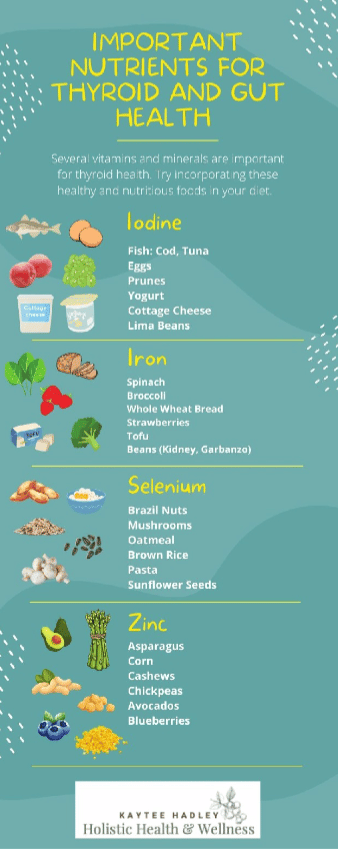This post is coauthored by Emily Simpson, a former intern at Holistic Health and Wellness.
Do you or someone you know suffer from hypothyroidism? Have you also been experiencing symptoms related to your gut? Have you ever wondered if there is a connection between your gut health and thyroid?
The answer is yes!
Thyroid and gastrointestinal problems are interconnected. Poor gut health impairs thyroid function and poor thyroid function impairs gut health.
Poor thyroid function can cause inflammation in the body which can lead to several gastrointestinal problems such as leaky gut, low stomach acid and small intestinal bacterial overgrowth (SIBO).
Luckily, we can implement strategies to support thyroid function and the gut all at once using the 5 R Approach.
Continue reading to find out how!
Thyroid Hormone
Table of Contents
The thyroid gland releases triiodothyronine (T3) and thyroxine (T4) which are important hormones that are a part of the body’s endocrine system.
These hormones are responsible for regulating metabolism, energy levels, and internal temperature, and also help with the body’s growth and development.
Thyroid hormones can become imbalanced when the thyroid produces too much or not enough.
Hypothyroidism
Hypothyroidism (underactive thyroid) is a condition in which the thyroid gland is unable to produce the necessary amount of thyroid hormones.
In the early stages of hypothyroidism, there may not be noticeable signs and symptoms.
However, if left untreated, this condition can cause a number of health concerns including thyroid and gastrointestinal problems.
Causes
Hypothyroidism can be caused by several factors which include:
● Hashimoto’s Disease, an autoimmune disorder where the immune system attacks the
thyroid
● Thyroiditis, inflammation of the thyroid
● Iodine deficiency
● Congenital hypothyroidism, occurs at birth
● Radiation treatment of the thyroid
● Certain medications
Thyroid and Gastrointestinal Problems
In addition to fatigue and weight gain, those with an underactive thyroid may experience gut
issues including:
● Poor absorption
● Constipation
● Small Intestine Bacterial Overgrowth (SIBO)
● Leaky gut
Thyroid and Leaky Gut
Leaky Gut
The lining of the stomach acts as a barrier that controls what enters and exits the bloodstream from the gut.
The barrier can become compromised when the microorganisms in the gut (aka “the gut microbiome”) are imbalanced, when inflammation is present, or for a variety of other reasons.
This “leaky gut” allows undigested food and toxins to enter into the bloodstream causing more inflammation and even food sensitivities.
Symptoms of Leaky Gut Include:
● Fatigue
● Bloating
● Constipation
● Irritable Bowel Syndrome
● Diarrhea
Leaky Gut and the Thyroid
Research has revealed that a leaky gut can pave the way for certain autoimmune diseases to develop.
When the gut lining is compromised, foreign entities such as bacteria, food particles, toxins, and drugs can enter into the bloodstream from the gut.
When this happens, the immune system is activated, and in many instances, it starts to attack the body. This can contribute to, or exacerbate, a variety of autoimmune diseases such as irritable bowel disease, celiac disease, and Hashimoto’s.
Causes of Leaky Gut
Factors that contribute to the development of leaky gut and thus the development of autoimmune diseases include:
● Poor diet, exercise, and sleep
● Genetic Susceptibility
● Environmental factors
● Certain medications and antibiotic use
Although we are unable to alter genetics, we can make decisions related to our diet, lifestyle, and environment that could be contributing to the development of leaky gut.
SIBO and the Thyroid
SIBO
Small Intestinal Bacterial Overgrowth (SIBO) is a condition in which too much bacteria grows in the small intestine.
SIBO is a result of a complex interaction that often involves food poisoning, slow motility of food moving through the digestive system, and low stomach acid. As a result, bacteria overgrow in the small intestine leading to an imbalance in the gut.
Symptoms of SIBO Include:
● Bloating
● Indigestion
● Gas
● Diarrhea or Constipation
● Fatigue
Cause of SIBO
SIBO can occur for a number of reasons, but for many people low stomach acid plays a role. Insufficient stomach acid allows bacteria to move past the stomach and into the small intestine
where it doesn’t belong.
If the body is not producing enough stomach acid, food is not being digested properly which means more food for the bacteria to feed on.
SIBO and the Thyroid
Hypothyroidism can contribute to SIBO because it slows down the rate at which food moves through the digestive tract due to low stomach acid, allowing the bacteria to overgrow.
In addition, SIBO can also cause hypothyroidism because the conversion of the hormone T4 into T3 is impaired in the gut.
5 R Functional Medicine Approach to Healing
Restoring health to the gut is one of the first steps to improving thyroid function because bacteria located in the gut help the thyroid hormone convert into its active form.
Additionally, healing the gut helps restore the gut lining, reducing food sensitivities, and calming the autoimmune response.
5 R Approach
The functional medicine framework to healing the gut is the 5R Approach: Remove, Replace, Repair, Reinoculate and Rebalance.
1. Remove
We first remove what’s irritating or harmful to the gut such as foods, pathogens, toxins and bacteria.
The thyroid is susceptible to damage from environmental toxins and certain food triggers, such as gluten and dairy, because they have similar structures to thyroid hormones.
2. Replace
Replacing missing elements such as digestive enzymes, bile and/or hydrochloric acid will help support the body’s digestion and absorption and improve the gut microbiome.
Replacing necessary vitamins and minerals can improve both gut health and thyroid function.
Save the graphic below and try to incorporate foods with these vitamins and minerals into your diet to promote health and address certain types of thyroid and gastrointestinal problems.

3. Reinoculate
Incorporating pre-and probiotic-rich foods into the diet helps beneficial bacteria flourish in the gut. Consumption of plants and fermented foods provide us with the fiber needed to feed the beneficial bacteria and help promote a healthy gut microbiome.
4. Repair
Repairing the gut lining of the gastrointestinal tract involves supplying key nutrients through nutraceuticals, foods, and supplements to help support a healthy and happy gut.
This is essential to healing leaky gut and the negative downstream effects on both gut health and thyroid.
4. Rebalance
Rebalancing and incorporating lifestyle changes are important to maintain a healthy gut.
Movement, stress reduction and sleep all play a role in maintaining optimal gut health both short and long term.
When this framework is catered to each individual’s unique gut health and needs, it supports and heals the digestive tract to provide a gateway to whole body health.
At Holistic Health and Wellness, we can help you implement the 5 R Approach and provide you with nutrition and lifestyle support to improve gut health and thyroid function.
Schedule a free discovery call to see if we are a good fit to support you in your health journey.
Key Takeaways
Gut health impacts thyroid health and vice versa, meaning that thyroid and gastrointestinal problems are connected!
Hypothyroidism (underactive thyroid) is a condition in which the thyroid gland is unable to produce the necessary amount of thyroid hormones.
The thyroid hormone releases triiodothyronine (T3) and thyroxine (T4) which are important hormones that are a part of the endocrine system and help regulate metabolism.
Thyroid imbalances affect gut health and can cause or contribute to gut imbalances including leaky gut and SIBO.
Research has revealed that a leaky gut can pave the way for certain autoimmune disease development.
When the gut lining is unhealthy, the tight barrier becomes compromised and allows undigested food and toxins to enter into our bloodstream which can contribute to the development of autoimmune diseases.
Common symptoms of hypothyroidism are constipation and low stomach acid, which can contribute to an overgrowth of bacteria in the small intestine called SIBO.
SIBO usually starts when the small intestine is unable to move food along like it should. As a result, bacteria multiplies and causes an imbalance in the gut which can lead to hypothyroidism.
An imbalanced gut microbiome can impair the body’s ability to absorb necessary nutrients.
Save the infographic provided for a reference of which foods are high in nutrients that support gut health and thyroid function.
Follow the 5 R Approach to heal the gut and restore thyroid balance: Remove, Replace, Repair, Reinoculate, and Rebalance.
At Holistic Health and Wellness, we can help you implement the 5 R Approach and provide you with nutrition and lifestyle support to improve gut health and thyroid function.
Schedule a free discovery call to see if we are a good fit to support you in your health journey.
Disclaimer: The information provided on this website is for educational purposes only and is not intended to diagnose or treat any disease. Please do not apply any of this information without first speaking with your doctor.
Bio: Emily Simpson grew up in the small town called Lodi located in Northern California. She received her Bachelor’s Degree in Exercise Science with an Emphasis in Nutrition Education. After working in nutrition education for her community, she realized she wanted to pursue a career as a Registered Dietitian. She is currently a Master’s student in the Nutrition, Healthspan, and Longevity program at the University of Southern California.

Kaytee Hadley MSc RDN IFMCP CPT is a functional medicine dietitian, holistic health coach, and certified personal trainer with a BA in Psychology, MSc in Nutrition, and Institute of Functional Medicine Certified Practitioner. She founded Holistic Health and Wellness to support folks with IBS and chronic GI symptoms who have been let down by the conventional care model to find and address the root causes of their symptoms naturally so they can be symptom free and thrive!


